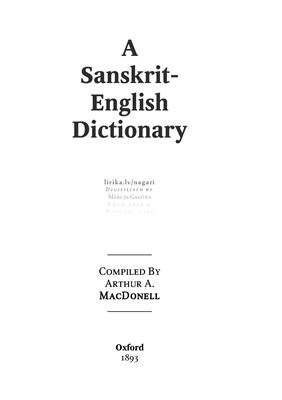Издательство: Oxford
Год: 1893
Количество страниц: 404
Язык: Английский
The aim of the present work is to satisfy within the compass of a comparatively handy volume
all the practical wants not only of leaers of Sanskrit but also of scholars for purposes of ordinary reading.
When I began my task in 1886 there was no available work which supplied the deficiency. The only one having a somewhat similar end in view, the Sanskrit-English Lexicon of my respected teacher, the late Theodore Benfey, was already out of print. By the time, however, that my manuscript was half finished, no fewer than three small Sanskrit dictionaries had been published. It may perhaps be advisable to indicate some of the points in which the present work differs from and compares with them. In the first place, it is much more copious. Excluding all words and meanings which occur in native lexicographers, but cannot be quoted from actual literature, my book contains nearly double as much material as any of the dictionaries in question. The present work is, moreover, the only one of the four, which is transliterated. It can thus be used, for example, by comparative philologists not knowing a single letter of the Devanagari alphabet. None of the others is etymological in any sense. This feature of my dictionary increases both its usefulness from a linguistic point of view and its practical value to the student, who will always better remember the meaning of a word, the derivation of which is made clear to him. Lastly, this is the only one of the lexicons in question which indicates not only with respect to words, but also to their meanings, the literary period to which they belong and the frequency or rarity of their occurrence. This addition I regard as both scientifically and practically important.
Scope of the Work. The present dictionary is intended to supply the vocabulary of post-Vedic literature in general, while including those portions of Vedic literature which are readily accessible to the student in good selections. All out-of-the-way technical terms, such as those of medicine, botany, astronomy, and ritual, are excluded, except in so far as they have found their way into ordinary literary works, or occur in selections which I have expressly included. Specifically legal and philosophical terms are, on the other hand, largely represented, owing to the inclusion in my list of the most important works belonging to the corresponding departments of literature. Having acquired a rather extensive experience of native commentaries in connexion with my lectures to students preparing for the Honour School of Oriental Languages at Oxford, I have introduced a considerable number of grammatical and rhetorical terms also, these being necessary for the comprehension of such works as for instance the glosses of Mallinatha. A good many words and explanations will thus be found, which either do not occur in the Petersburg dictionaries, or are, I think, less correctly given there. (Compare e.g. articles arthantaranyasa, bahuvrihi, yatha tatha, vakyabheda, vyadhikarawa, sapekshatva, etc.)
Год: 1893
Количество страниц: 404
Язык: Английский
The aim of the present work is to satisfy within the compass of a comparatively handy volume
all the practical wants not only of leaers of Sanskrit but also of scholars for purposes of ordinary reading.
When I began my task in 1886 there was no available work which supplied the deficiency. The only one having a somewhat similar end in view, the Sanskrit-English Lexicon of my respected teacher, the late Theodore Benfey, was already out of print. By the time, however, that my manuscript was half finished, no fewer than three small Sanskrit dictionaries had been published. It may perhaps be advisable to indicate some of the points in which the present work differs from and compares with them. In the first place, it is much more copious. Excluding all words and meanings which occur in native lexicographers, but cannot be quoted from actual literature, my book contains nearly double as much material as any of the dictionaries in question. The present work is, moreover, the only one of the four, which is transliterated. It can thus be used, for example, by comparative philologists not knowing a single letter of the Devanagari alphabet. None of the others is etymological in any sense. This feature of my dictionary increases both its usefulness from a linguistic point of view and its practical value to the student, who will always better remember the meaning of a word, the derivation of which is made clear to him. Lastly, this is the only one of the lexicons in question which indicates not only with respect to words, but also to their meanings, the literary period to which they belong and the frequency or rarity of their occurrence. This addition I regard as both scientifically and practically important.
Scope of the Work. The present dictionary is intended to supply the vocabulary of post-Vedic literature in general, while including those portions of Vedic literature which are readily accessible to the student in good selections. All out-of-the-way technical terms, such as those of medicine, botany, astronomy, and ritual, are excluded, except in so far as they have found their way into ordinary literary works, or occur in selections which I have expressly included. Specifically legal and philosophical terms are, on the other hand, largely represented, owing to the inclusion in my list of the most important works belonging to the corresponding departments of literature. Having acquired a rather extensive experience of native commentaries in connexion with my lectures to students preparing for the Honour School of Oriental Languages at Oxford, I have introduced a considerable number of grammatical and rhetorical terms also, these being necessary for the comprehension of such works as for instance the glosses of Mallinatha. A good many words and explanations will thus be found, which either do not occur in the Petersburg dictionaries, or are, I think, less correctly given there. (Compare e.g. articles arthantaranyasa, bahuvrihi, yatha tatha, vakyabheda, vyadhikarawa, sapekshatva, etc.)

